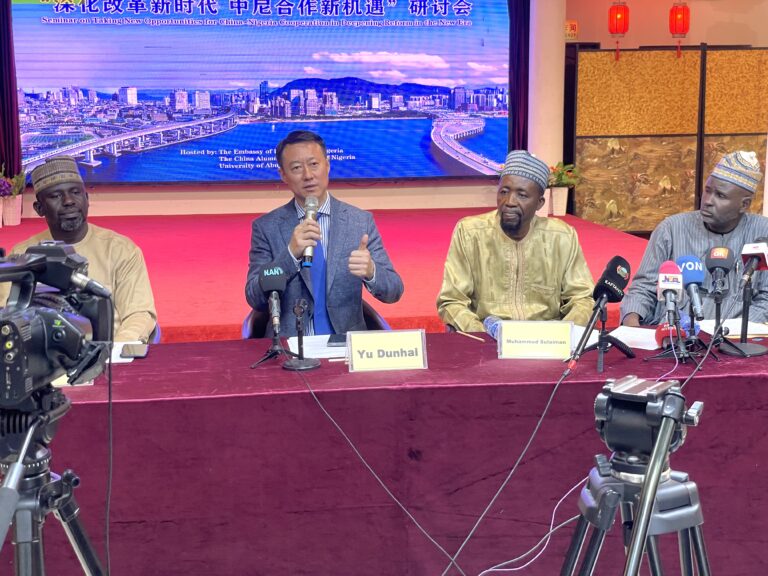- Safiu Kehinde
China’s Ambassador to Nigeria, Yu Dunhai, has urged Nigeria to adopt strategic reforms and poverty alleviation mechanisms in order to fastrack the nation’s economic growth by Investing in its human capital.
The ambassador stated this during a seminar on: “Taking New Opportunities for China-Nigeria Cooperation in Deepening Reform in the New Era,” organized by the Embassy on Thursday in Abuja.
While stressing the importance of collaboration between the two nations, You tasked Nigeria to draw from China’s own experiences in lifting about 800 million people out of poverty over the past few decades.
Yu outlined several key recommendations for Nigeria, focusing on enhancing agricultural productivity, promoting vocational training, and fostering infrastructural development.
“Poverty alleviation is not just about financial support; it is about creating sustainable opportunities.
“Investing in human capital is essential. China also invested a lot in educating its people from having 1 million students yearly to having over 13 million university students every year.
“We also provided vocational training for many people because we believe the vital role education plays in equipping young people with the skills is crucial for building a prosperous future,” he noted.
The Chinese envoy said that Nigeria could benefit from adopting a multi-faceted approach similar to the one employed by China.
Yu while acknowledging Nigeria’s strides in poverty reduction, particularly in urban areas, pointed out the persisting challenges in rural regions where poverty rates remain high.
He said that China’s agricultural reforms in the late 20th century were a model, which involved introducing modern farming techniques, improving irrigation systems, and providing farmers with better access to markets.
The ambassador also stressed the importance of education and vocational training as critical components of poverty alleviation.
He highlighted China’s significant investments in education, nurturing millions of university students annually, and offering vocational training to equip individuals with essential skills for a prosperous future.
Yu further urged the Nigerian government to prioritise investments in key infrastructure such as roads, electricity, and transportation networks, noting that they were crucial for economic growth and poverty alleviation.
He cited China’s progress in the electric vehicle market and transportation sector as examples of how infrastructural development fuels economic advancement.
Yu added that in line with China’s commitment to continuous reform, over 300 reform measures were set to be achieved in the next five years.
He said that this was because a successful poverty eradication is attributed to continuous reform, which removes outdated practices and obstacles.
While advocating for openness to learning from other nations, Yu highlighted the importance of preserving each country’s unique history, culture, and identity.
He stressed the value of mutual learning and exchange without resorting to mere imitation.
In his response, Mr Muhammad Sulaiman, President of the Society of Nigerian Artists, echoed Nigeria’s dedication to reform efforts.
He said that Nigeria was committed to economic restructuring and growth across various sectors.
Meanwhile, both nations expressed the desire to further strengthen their partnerships in various sectors, including trade, technology, and education.


